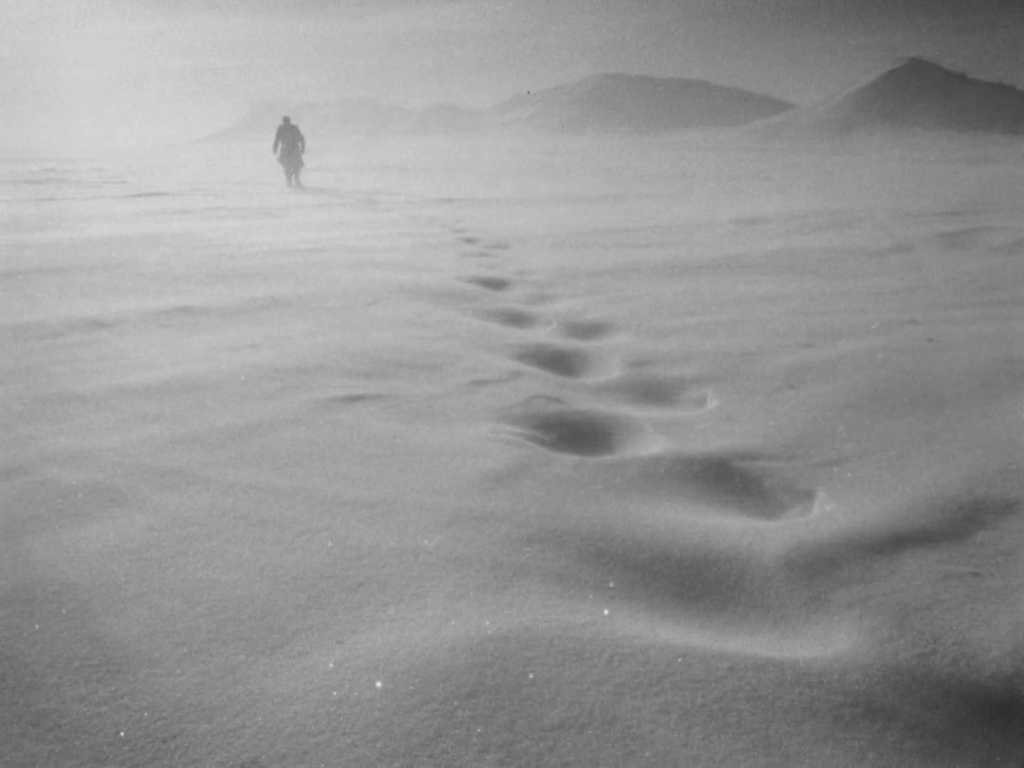| Cole Seidl |

Letter Never Sent plays at the Trylon Cinema from Friday, March 3 through Sunday, March 5. Visit trylon.org for tickets and more information.
Letter Never Sent is many things: a visual tour-de-force, a technological marvel, an allegory of Soviet resilience, a grueling survival thriller. It is also, notably, the rare great film that openly rejects an individualist perspective in its storytelling. The problem of individualism in narrative cinema remains one of the most curiously resistant to change, even as our cultural mores and production modes shift. Here in the United States, it is difficult to find any films that don’t share this individualist sensibility, though it is also common in films from all cultures. Sometimes, it can be tricky to recognize this sensibility because there are a great variety of approaches to individualism, each carrying drastically different ideological implications. This variety is most obvious in American (anti)war films.
Scottish comedian Frankie Boyle tells a joke in which he says, “Not only will America go into your country and kill all your people, but what’s worse I think is they will come back 20 years later and make a movie about how killing your people made their soldiers feel sad.” This joke’s provocation immediately calls to mind dozens of films that do exactly this. The first film I think of is Clint Eastwood’s American Sniper—a film that has been read, alternately, as pro and anti-war. I suspect that the reason for the muddled interpretations of the film’s basic ideology has to do with its individualist sensibility. Bradley Cooper’s Chris Kyle is undoubtedly harmed by the killing he does on behalf of his country, but the film is so focused on Kyle that there is little beyond his trauma. Not only does the film ignore the trauma of an entire country that was invaded illegally and immorally; not only does it ignore the culpability of those who used Kyle as a tool for inflicting that trauma on millions of undeserving people; but it also ignores the trauma of most other U.S. soldiers involved in the war. Chris Kyle’s psychological trauma is the only trauma meriting investigation, any irrational behavior by other traumatized soldiers is reflective of their essence. Eastwood’s film utilizes a sense of individual suffering to obscure the greater issues at play. It is microcosm as myopia.
On the other hand, take a film like Ted Kotcheff’s First Blood. Undoubtedly an individualist film, every action is fueled by the damage the Vietnam War has inflicted upon Sylvester Stallone’s John Rambo. Yet, it feels so far from American Sniper that it’s tempting to consider it an ideological opposite. First Blood uses Rambo as a microcosm in the Balzacian sense—as a demand to consider him as a tiny piece of a much larger, possibly incomprehensible, whole.1 Rambo’s trauma isn’t just his trauma, it’s shared by countless other veterans, none of whom we actually meet in the film. More importantly, his suffering isn’t used to obscure the culpability of those who sent him to Vietnam. First Blood utilizes its individualism as an indictment of specific systems of power and a demand for culpability.
This variety of approaches to individualist cinema distracts from the fact that cinematic attempts at representing communities are incredibly rare. John Sayles is one of the few American filmmakers to try this, in films like Matewan, City of Hope, and Sunshine State.2 More often than not, however, we have to look outside of the United States. The Third Cinema movement, prominent in Latin America in the 1970s, made a few interesting contributions to this, but the most obvious place to look would be the U.S.S.R., which gave us Letter Never Sent.
Letter Never Sent is probably best known as Mikhail Kalatozov’s other masterpiece, starring Tatiana Samoylova and featuring mind-boggling camera work by Sergei Urusevsky.3 I can’t help but look at the film as a standout in a broader genre of survival films. My default joke whenever someone mentions the film is to reply, “you mean collectivist The Revenant?” It’s a dumb joke that brings no one joy except for me, and, at the same time, feels enlightening (again, to no one except for me). How does the survival film genre change when the individualist lens that is so typical of these films is simply removed (or warped)? This is the question I place in the forefront every time I watch Letter Never Sent.

When we look at survival films, it seems obvious that they are about the attempt to avoid death in the face of harsh elements. Less obvious is the question of why. When we default to an individualist lens, this question doesn’t really feel pressing. After all, we are instinctually programmed to avoid death. This is where a film like Jerzey Skolimowski’s Essential Killing proves interesting. Essential Killing focuses ostensibly on a Taliban militant (played by Vincent Gallo) forced to survive barefoot in a wintry foreign landscape and avoid detection by his American adversaries. The character doesn’t speak. His political views are meaningless. He is reduced to his basic human instinct to not die. The film is the distillation of why our characters fight for survival in this genre from within the individualist lens.

Other films like The Revenant, Deliverance, 127 Hours, and Cast Away obscure their “human instinct” arguments with layers of a need for revenge, a forced reflection on past wrongs, or an opportunity for self-actualization, all of which stem from the ideology of survival as a form of personal growth.4 Here, survival is still an instinct as it is in Essential Killing, but it’s also a moral imperative for an individual to grow within. We don’t survive just because we are human, but because we are humans with business to attend to (however, that business is still the business of the self).
This is taken to an absurd extreme in Lee Tamahori’s The Edge, written by David Mamet, who, even before his self-proclaimed conversion to conservativism, was one of the most profound individualist writers. In the film, a humble billionaire (played by Anthony Hopkins) filled with self-doubt about whether his success is actually indicative of his superiority to anyone else, crashes into the Alaskan wilderness with those who leech off of his creativity and wealth. Each of them is slowly killed off by the elements (and a seemingly crazed grizzly bear) and could only have been saved by the billionaire’s ingenuity. Each of them either refuses his help, or attempts to betray him. By surviving, Hopkins’s character proves that his status was indeed the result of his inherent supremacy to all those around him.

Letter Never Sent, on the other hand, doesn’t suggest personal growth through survival. Our characters will not be better off as individuals if they come out the other end of this alive. They will be traumatized and weakened. The reason for their survival, other than the basic human instinct, is the betterment of Soviet society. If our four heroes (Tatiana Samoylova, Innokentiy Smoktunovskiy, Vasiliy Livanov, and Evgeniy Urbanskiy) can survive, they will bring a map of Siberian diamond deposits with them, allowing for massive technological development and the betterment of all people within the USSR.5
It is also noteworthy that only one character needs to survive for this collective goal—not to prove their superiority, but simply to pass off the information. This is not a subtle theme; it is made explicit several times throughout the film. This explicitness is jarring not only for its didactic and hyper-rational nature, but because of how alienating it may feel to those of us who have been raised on films that tell their stories through an individualist lens. However, it doesn’t feel less authentic than an appeal to survival as a vessel for self-actualization or proof of the morality of class systems. It is simply another layer on top of the basic human instinct, one that allows our individual survival to have meaning beyond ourselves, for the benefit of others—a macrocosm we do not get to see onscreen most of the time. Letter Never Sent has many pleasures to offer, not the least of which is its visual inventiveness. But offering an alternative ideological lens for a genre I often grow tired of is the pleasure I appreciate most.
NOTES
1 “For him [Honoré De Balzac], a fragment was an indication of the whole requiring interpretation; on both small and large scales he depended on readers to grasp the sense of these parts and to tie them together with others.” – Allan H. Pasco, Balzacian Montage: Configuring La Comédie Humaine (1991), University of Toronto Press [vii]
2 Interestingly, Sayles’ foray into the survival genre, Limbo, shifts from a communal lens towards the more typical individualist perspective.
3 The most notable film by this trio is probably The Cranes Are Flying, also playing at the Trylon. Kalatozov and Urusetsky would make another world cinema classic, sans Samoylova, in 1964 called Soy Cuba [I Am Cuba].
4 Also of note is Everest (2015), which seems to put everyone into a fight for survival for no discernable reason at all.
5 The specific example we are given references the diamonds’ usefulness in the Space Race, highlighting the Cold War era in which the film was produced.
Edited by Olga Tchepikova-Treon
